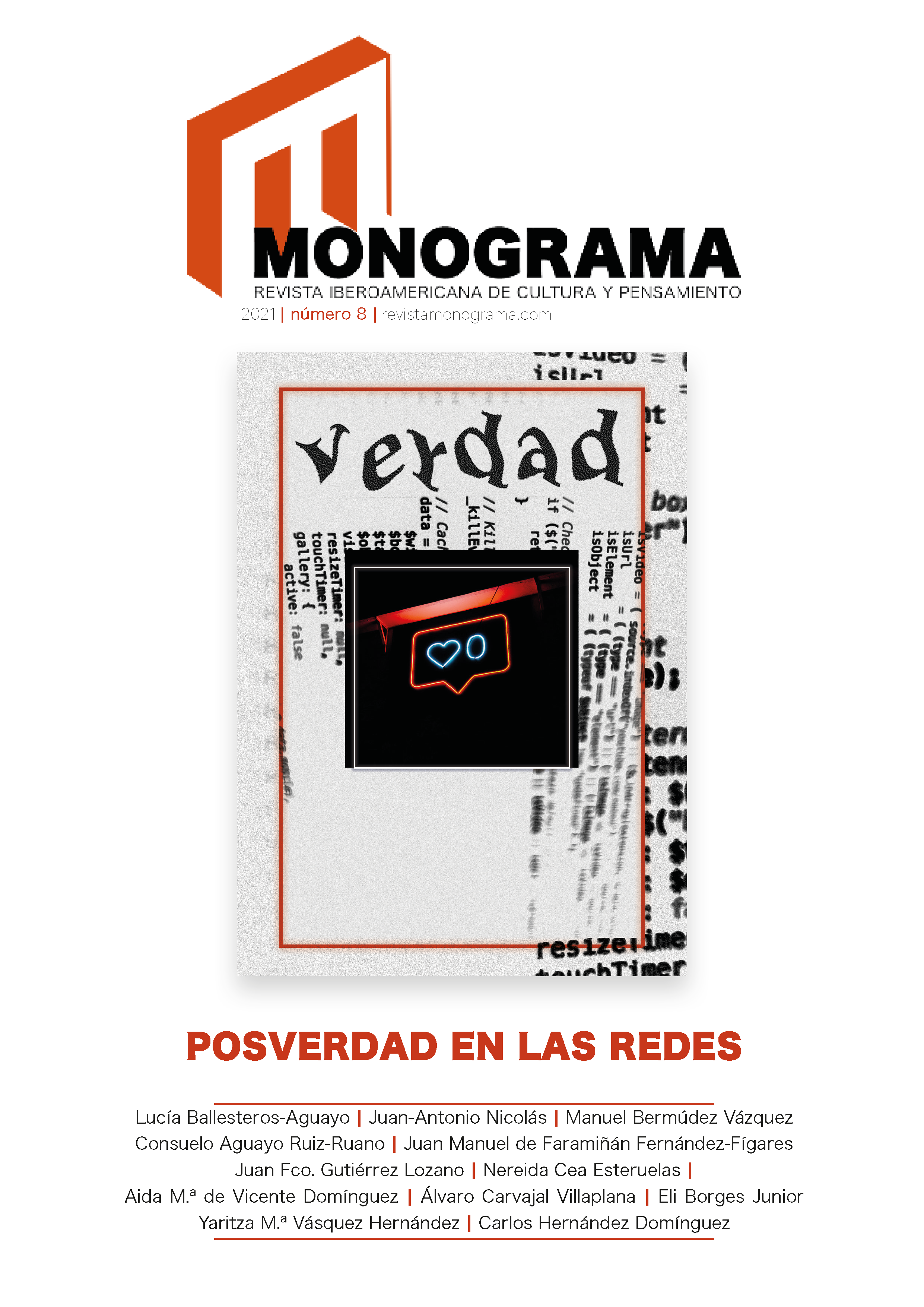Post-truth and Fake News: Perverse Schemes of Democratic Interference
DOI:
https://doi.org/10.36008/monograma.2021.08.1422Keywords:
post-truth, fake news, critical thinking, political theoryAbstract
Our time have led us to a particularly complex situation. We present here an analysis in which four political and teaching mechanisms pose a very serious threat to the functioning of our democracy. These mechanisms are: demagogy, fake news, post-truth and the lack of critical thinking. With a brief but forceful presentation of the devastating effects that these elements are already causing, what we propose is to alert society in order to allow the necessary corrective measures.
Downloads
References
ARISTÓTELES (1988). Política. Madrid: Gredos.
ARISTÓTELES (1994). Retórica. Madrid: Gredos.
BARTHES, Roland (1999). «El mundo de la lucha libre». En Mitologías. Madrid: Siglo XXI, pp. 8-14.
BERMÚDEZ VÁZQUEZ, Manuel y CASARES LANDAURO, Elena (2019). «El problema de la posverdad en la sociedad contemporánea». En BERMÚDEZ, Manuel y BALLESTEROS, Lucía (eds.). Comunicación digital: retos y oportunidades. Sevilla: Egregius, pp. 55-68.
BERMÚDEZ VÁZQUEZ, Manuel (2019). «Análisis del concepto ‘posverdad’ desde la óptica de la retórica clásica». Diálogo filosófico, 105, pp. 341-352.
COMISIÓN EUROPEA (2019). «Unión Europea vs Desinformación». 5 de noviembre. Disponible en: https://ec.europa.eu/spain/news/20191105_eu-vs-disinformation_es [Consulta: 7 noviembre 2020].
COMISIÓN EUROPEA (2020). «Lucha contra la desinformación». Agosto de 2020. Disponible en: https://ec.europa.eu/info/live-work-travel-eu/coronavirus-response/fighting-disinformation_es [Consulta: 7 noviembre 2020].
D’ANCONA, Matthew (2019). Posverdad. La nueva guerra contra la verdad y cómo combatirla. Madrid: Alianza.
RAE (2020). «Posverdad». Disponible en: https://dle.rae.es/posverdad?m=form [Consulta: 7 diciembre 2020].
EUROSTAT (2020). «Estadísticas sobre sociedad y economía digital-Hogares y particulares». 19 de octubre. Disponible en: https://ec.europa.eu/eurostat/statistics-explained/index.php?title=Digital_economy_and_society_statistics_-_households_and_individuals/es [Consulta: 7 diciembre 2020].
FERNÁNDEZ GONZÁLEZ, Noelia (2015). «Pisa como instrumento de legitimación de la reforma de la LOMCE». Sociedad Española de Pedagogía, 67(1), pp. 165-178.
FERNÁNDEZ LIRIA, Carlos, GARCÍA FERNÁNDEZ, Olga y GALINDO FERRÁNDEZ, Enrique (2017). Escuela o barbarie. Entre el neoliberalismo salvaje y el delirio de la izquierda. Madrid: Akal.
FUNDÉU (2016). «Populismo, palabra del año 2016 para la Fundéu». 30 de diciembre. Disponible en: https://www.fundeu.es/recomendacion/populismo-palabra-del-ano-2016-para-la-fundeu-bbva [Consulta: 27 octubre 2020].
FUNDÉU (2017). «Ciberanzuelo, la alternativa favorita de nuestros seguidores a clickbait». 25 de abril. Disponible en: https://www.fundeu.es/noticia/ciberanzuelo-la-alternativa-favorita-de-nuestros-seguidores-a-clickbait/ [Consulta: 7 diciembre 2020].
GARTNER (2017). «Gartner Reveals Top Predictions for IT Organizations and Users in 2018 and Beyond». 3 de octubre. Disponible en: https://www.gartner.com/en/newsroom/press-releases/2017-10-03-gartner-reveals-top-predictions-for-it-organizations-and-users-in-2018-and-beyond [Consulta: 7 diciembre 2020].
HAMODI GALÁN, Carolina y JIMÉNEZ ROBLES, Leire (2018). «Modelos de prevención del bullying: ¿qué se puede hacer en educación infantil? Revista de Investigación Educativa de la REDIECH, vol. 9, núm. 16. Disponible en: http://www.scielo.org.mx/scielo.php?script=sci_arttext&pid=S2448-85502018000100029#B24 [Consulta: 21 diciembre 2020].
JORDAN, Kayla, STERLING, Joanna, PENNEBAKER, James y BOYD, Ryan (2019). «Examining long-term trends in politics and culture through language of political leaders and cultural institutions». Proceedings of the National Academy of Sciences, 116, pp. 3476-3481.
LEITH, Sam (2011). Are you talking to me: Rhetoric from Aristotle to Obama. Londres: Profile Books.
MARTÍNEZ PRADALES, David (2019). «En 2022 consumiremos más noticias falsas que verdaderas». 2 de abril. Disponible en: https://www.nobbot.com/general/noticias-falsas-2022 [Consulta: 7 diciembre 2020].
MCINTYRE, Lee (2020). Posverdad. Madrid: Cátedra.
NICOLÁS, Juan Antonio (2019). «Posverdad: cartografía de un fenómeno complejo». Diálogo Filosófico, 105, pp. 302-340.
ORTEGA, Sylvia, RAMÍREZ, Marco y CASTELÁN, Adrián (2005). «Estrategias para prevenir y atender el maltrato, la violencia y las adicciones en las escuelas públicas de la Ciudad de México». Revista Iberoamericana de Educación, 38, pp. 147-169.
OXFORD LANGUAGES (2016). «Word of the year 2016», Disponible en: https://languages.oup.com/word-of-the-year/2016 [Consulta: 27 octubre 2020].
PLATÓN (2003). República. Madrid: Gredos.
RODRÍGUEZ, Roberto (2008). «La tradición liberal». En Quesada, Fernando (ed.). Ciudad y ciudadanía. Senderos contemporáneos de la filosofía política. Madrid: Trotta, pp. 7-30.
RUIZ, José Carlos (2019). El arte de pensar. Córdoba: Berenice.
SANDEL, Michael (2019). Lo que el dinero no puede comprar. Madrid: Debate.
SAURA, Geo y MUÑOZ MORENO, José Luis (2016). «Prácticas neoliberales de endo-privatización y nuevas formas de resistencia colectiva en el contexto de la política educativa española». Revista Educación, Política y Sociedad, 1(2), pp. 43-72.
SHEARER, Elisa y MATSA, Katerina Eva (2018). «News Use Across Social Media Platforms 2018». 10 de septiembre 2018. Disponible en: https://www.journalism.org/2018/09/10/news-use-across-social-media-platforms-2018. [Consulta: 7 diciembre 2020].
TARÍN SANZ, Adrián (2018). «Comunicación, ideología y poder: Anotaciones para el debate entre la Teoría de la Propaganda Intencional y la Teoría de la Reproducción Espontánea de la Propaganda». Comunicación y sociedad, 32, pp. 191-209.
THE GUARDIAN (2020). «Tsunami of untruths’: Trump has made 20.000 false or misleading claims-report». 13 de julio. Disponible en: https://www.theguardian.com/us-news/2020/jul/13/donald-trump-20000-false-or-misleading-claims [Consulta: 7 diciembre 2020].
TIME (2017). «Is truth death?». 3 de abril. Disponible en: https://time.com/magazine/us/4710599/april-3rd-2017-vol-189-no-12-u-s [Consulta: 20 diciembre 2020].
UNESCO (2019). «Behind the numbers: Ending school violence and bullying». 22 de enero. Disponible en: https://es.unesco.org/news/violencia-y-acoso-escolares-son-problema-mundial-segun-nuevo-informe-unesco [Consulta: 21 diciembre 2020].
WASHINGTON POST (2020). «President Trump has made more than 20.000 false or misleading claims». 13 de julio. Disponible en: https://www.washingtonpost.com/gdpr-consent/?next_url=https%3a%2f%2fwww.washingtonpost.com%2fpolitics%2f2020%2f07%2f13%2fpresident-trump-has-made-more-than-20000-false-or-misleading-claims%2f [Consulta: 7 diciembre 2020].
Downloads
Published
How to Cite
Issue
Section
License
Copyright (c) 2021 Monograma. Revista Iberoamericana de Cultura y Pensamiento

This work is licensed under a Creative Commons Attribution-NonCommercial-NoDerivatives 4.0 International License.
Esta obra está bajo una licencia de Creative Commons Reconocimiento-NoComercial-SinObraDerivada 4.0 Internacional






